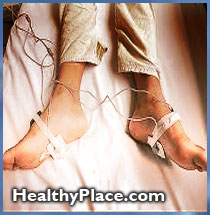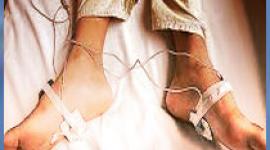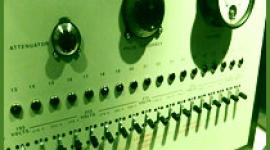Shock Therapy: Positive and Negative Charges
The Washington Post
Tom Graham
06-06-2000
 The extensive memory loss described by Ann Lewis in the accompanying article reinforces some of the widespread negative impressions about electroconvulsive therapy. Even supporters of ECT acknowledge that memory loss is a common side effect, though they say it is typically far less severe than that reported by Lewis.
The extensive memory loss described by Ann Lewis in the accompanying article reinforces some of the widespread negative impressions about electroconvulsive therapy. Even supporters of ECT acknowledge that memory loss is a common side effect, though they say it is typically far less severe than that reported by Lewis.
Juan Saavedra, the Bethesda psychiatrist who treated Lewis before she underwent ECT, says he generally considers this therapy only for a very old person who would have trouble tolerating medication or for a person who is "in danger of suicide [where] you really cannot wait for the antidepressants to be effective." In discussing this as an option, he says, "my approach will be to say that the most important thing is preservation of life."
"There is always a lot of fears, and it's understandable" in light of publicized cases of "people who have been mistreated," says Saavedra, who adds that in his experience the majority of patients who are urged to receive ECT agree to do so.
"There is no way to predict" the degree of memory loss from ECT, Saavedra says. "Every treatment has its possibilities of something going wrong," but ECT is "a very safe procedure these days." Not nearly safe enough, in the view of those who believe ECT remains more dangerous than it's worth.
"The shock induces an electrical storm that obliterates the normal electrical patterns in the brain, driving the recording needle on the EEG up and down in violent, jagged swings. This period of extreme bursts of electrical energy often is followed by a briefer period of absolutely no electrical activity. . . . The brain waves become temporarily flat, exactly as in brain death, and it may be that cell death takes place at this time."
That's the view of another Bethesda psychiatrist, Peter Breggin, in his book "Toxic Psychiatry." Breggin's Web site, breggin.com, is only one of many (ect.org, antipsychiatry.org, banshock.org, etc.) that warn about the nasty repercussions of ECT.
Last year's Surgeon General's Report on Mental Health gave ECT's opponents little solace, though it did acknowledge some of the scientific mysteries and past misuses of the therapy since it was developed in the 1930s:
"ECT consists of a series of brief generalized seizures induced by passing an electric current through the brain by means of two electrodes placed on the scalp. . . . The exact mechanisms by which ECT exerts its therapeutic effect are not yet known. . . . Accumulated clinical experience--later confirmed in controlled clinical trials . . .--determined ECT to be highly effective against severe depression, some acute psychotic states and mania. No controlled study has shown any other treatment to have superior efficacy to ECT in the treatment of depression."
On the issue of memory loss, the report suggests that most patients are far less affected than Lewis was: "The confusion and disorientation seen upon awakening after ECT typically clear within an hour. More persistent memory problems are variable. Most typical . . . has been a pattern of loss of memories for the time of the ECT series and extending back an average of six months, combined with impairment with learning new information, which continues for perhaps two months following ECT."
The report also reiterated the medical establishment's conclusion that ECT is a worthwhile tool for treating certain mental disorders:
"Although the average 60 to 70 percent response rate seen with ECT is comparable to that obtained with pharmacotherapy, there is evidence that the antidepressant effect of ECT occurs faster than that seen with medication, encouraging the use of ECT where depression is accompanied by potentially uncontrollable suicidal ideas and actions. However, ECT does not exert a long-term protection against suicide. Indeed, it is now recognized that a single course of ECT should be regarded as a short-term treatment for an acute episode of illness."
Or as Saavedra said last week, "ECT doesn't cure anything."
next: Shock Treatment!
~ all Shocked! ECT articles
~ depression library articles
~ all articles on depression
APA Reference
Staff, H.
(2000, June 6). Shock Therapy: Positive and Negative Charges, HealthyPlace. Retrieved
on 2026, January 11 from https://www.healthyplace.com/depression/articles/shock-therapy-positive-and-negative-charges



